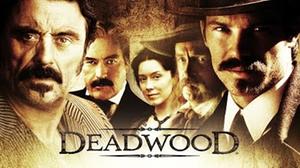 breathing in.
breathing in.
breathing out.
breathing, in
Kalamazoo, Michigan.
--Posted on Facebook by this is a bookstore & Bookbug, Kalamazoo, Mich.
What are you doing in a week like this? What is the week doing to you? Spend five minutes on social media at any point since Election Day, and you'll be fried to a psychological crisp. Breathe.
What have I been doing? Working, refreshing my laptop incessantly for updates that never come, and revisiting the early 21st century HBO series Deadwood, beginning with an episode titled "Plague," in which smallpox comes to the mud- and blood-drenched camp. Plague meets politics. Seemed timely somehow.
"F**kin' plague" is what Al Swearengen (Ian McShane), Deadwood's leading citizen--generally for the worse, if occasionally, despite his nature, the better ("Treat the hoopleheads free; that's cheap good will.")--calls the disease.
 When Doc corrects him ("Smallpox. Plague is spread by rats."), Al counters: "Well, I was raised callin' it plague but Doc wants that in reserve, in case our luck holds, and the rats decide to descend on us, too hmm?.... I've outlasted several f**kin' outbreaks. Is it pretty? No, but it passes, so, we need a place for them to get it. To care for 'em, and to keep 'em outta sight. So people don't get frightened and disgusted."
When Doc corrects him ("Smallpox. Plague is spread by rats."), Al counters: "Well, I was raised callin' it plague but Doc wants that in reserve, in case our luck holds, and the rats decide to descend on us, too hmm?.... I've outlasted several f**kin' outbreaks. Is it pretty? No, but it passes, so, we need a place for them to get it. To care for 'em, and to keep 'em outta sight. So people don't get frightened and disgusted."
Like any wily political animal, Al tries to spin the editorial coverage of The Pioneer: "Yeah, give some sort of positive angle to it. Vaccine's on its way, or looks like it's the mild f**kin' type." At the last minute, he even suggests a headline change: "I think maybe it should have a question mark. 'The Plague in Deadwood?' "
Can't say I felt better after my trip to Deadwood, so I moved on to other distractions, including the recollection of something I'd written during a not dissimilar day-after-election state of prolonged acedia years ago. On November 4, 2004, while I was still a full-time indie bookseller, I posted the following on my blog Fresh Eyes: A Booksellers Journal under the headline "The Case of the Silenced Rant Lit":
*
He'd been a bookseller for a dozen years, so he was on familiar terrain when he entered the shop yesterday morning. He expected no surprises. Books were his game. He knew them inside and out, though mostly inside. Well, the outside was important, too. Let's just say he knew books.
Something wasn't quite right on this particular morning, however. It was the day after THE ELECTION, and the place just felt different--eerie, unnatural, almost abandoned. It looked the same, but it clearly wasn't. Too quiet, he decided, just too damned quiet. It was the kind of quiet you get in a war movie, when one guy in the foxhole says, "What's that?" and the other guy says, "I don't hear nothin'," and the first guy says, "That's what I mean," and then the barrage starts.
It was the kind of quiet you get when birds aren't making the sounds they should, as if everything in the world was waiting for a twig to snap. He walked the floor, searching for clues. He asked questions, talked to a few other booksellers, but "nobody knew nothin'," or so they said. He wasn't sure whether to believe them, but for the moment he chose to continue his investigation until something turned up.
In his office, he checked e-mail and found a note from a former colleague: "I will either be moving to Canada or opening my wrists. It's been great knowing all of you." Sounded suspicious, but it didn't seem directly tied to the silence, so he tried not to let it distract him.
It wasn't until he reached the front of the store, where most of the new books were displayed, that the case really began to come together. This, he realized, was where the quiet was coming from.
For the past seven or eight months, so many of the books up here had been screaming at one another, shouting each other down, making public nuisances of themselves, ranting across a wide chasm that had opened between two opposing sides.
Books weren't being published; they were being hurled ferociously across this divide in a high stakes game of book dodgeball, in which nobody ever seemed to hit anything, despite casualties everywhere you looked. And so the noisy books continued to arrive. They eyed one another from opposing displays, screaming their titles at passing customers:
"Let me tell you about these unscrupulous idiots," they said, with varying degrees of ferocity.
"Oh, yeah?" one book would scream.
"Yeah!" another shot back.
And so it went, on and on. Customers complained about the noise. Sometimes they complained more about the noise coming from one side of the chasm than the other. Sometimes they joined the screaming, singling out the booksellers for not allowing an equal number of screams from both sides.
And then, quite suddenly, on the "day after," the books were all quiet in the store. Some of them seemed to be pinching their lips together, holding their breath, waiting for the next chance to scream about something. Others, many others, seemed quiet because they had nothing more to say. They were exhausted. They had won or they had lost. They were hoarse from all the screaming. Their lips were sealed. Case closed.
*
 Well, case not quite so f**kin' closed, as Al might say. Perspective, it turns out, isn't everything. So what's next? The waiting, of course, but maybe also just a pinch of anticipation to keep us focused. Because, as Tattered Cover Book Store, Denver, Colo., reminded me yesterday while I was writing this, November is also the New December.
Well, case not quite so f**kin' closed, as Al might say. Perspective, it turns out, isn't everything. So what's next? The waiting, of course, but maybe also just a pinch of anticipation to keep us focused. Because, as Tattered Cover Book Store, Denver, Colo., reminded me yesterday while I was writing this, November is also the New December.
--Robert Gray, editor

